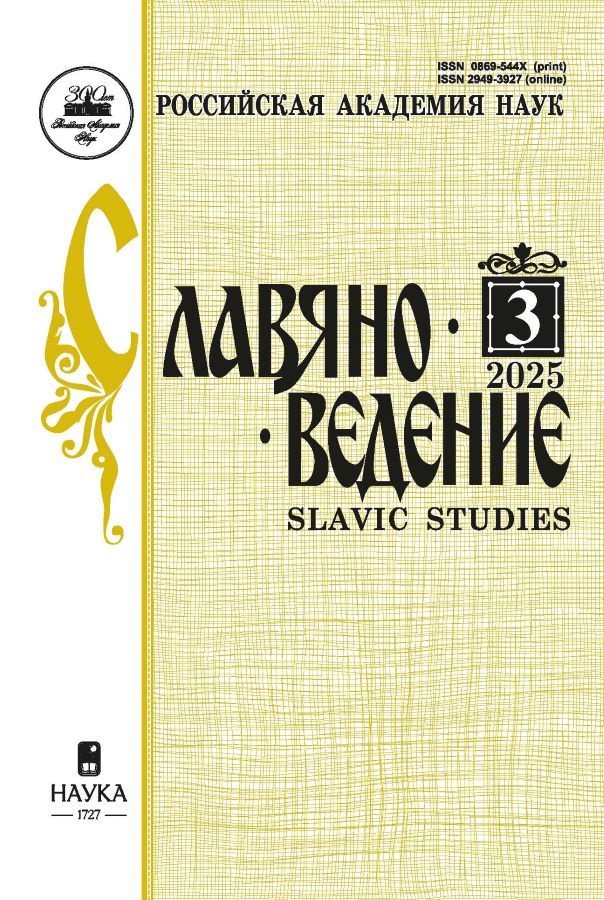Toska ‘Sorrow’ and its contextual «partners» in russian charms. I.
- Authors: Agapkina T.A.1
-
Affiliations:
- Institute of Slavic Studies of Russian Academy of Sciences
- Issue: No 6 (2024)
- Pages: 5-21
- Section: Articles
- URL: https://kazanmedjournal.ru/0869-544X/article/view/652920
- DOI: https://doi.org/10.31857/S0869544X24060015
- EDN: https://elibrary.ru/XHUXHO
- ID: 652920
Cite item
Abstract
The article describes the main contexts of the word toska ‘sorrow’ and its derivatives in Russian charms, the correlation of these contexts with different functional types of charms (medical, love, cattle breeding, charms for power, etc.). Also the features of the sorrow image are formulated within these types with more or less certainty: its personification and subjectivity, material nature, allowing its physical elimination as an object, the correlations of sorrow and death, and finally the fiery nature of sorrow. The study of the word toska in Russian charms of different functional orientation revealed its five basic meanings: ‘illness’, ‘pain’, ‘mental illness of unclear etiology', ‘suffering in separation’ and ‘irresistible sadness in the absence of reciprocity’. It was found that the dialectal semantics of the Russian word toska and its derivatives fully correspond to its meanings in charms, while in the literary language the concrete physical meanings of the word toska are mostly lost.
Keywords
About the authors
Tatiana A. Agapkina
Institute of Slavic Studies of Russian Academy of Sciences
Author for correspondence.
Email: agapi-t@yandex.ru
ORCID iD: 0000-0001-8098-7471
DSc. (Philology), Chief Research Fellow
Russian Federation, MoscowReferences
- Apresian Iu.D. Novyi ob”iasnitel’nyi slovar’ sinonimov: Kontseptsiia i tipy informatsii, Novyi ob”iasnitel’nyi slovar’ sinonimov: Prospekt, Moscow, Russkije slovari Publ., 1995, 558 p. (In Russ.)
- Baiburin A.K. Toska i strakh v kontekste pokhoronnoi obriadnosti. Trudy fakul’teta etnologii. Vyp. 1, St. Petersburg, Jevropeiskij un-t v Sankt-Peterburge Publ., 2001, pp. 96–115. (In Russ.)
- Chernykh P.Ia. Istoriko-etimologicheskii slovar’ sovremennogo russkogo iazyka, Moscow, Rus. iazyk Publ., 1999, vol. 1–2. (In Russ.)
- Fasmer M. Etimologicheskii slovar’ russkogo iazyka, per. s nem. i dop. O.N. Trubacheva, Moscow, Progress Publ., 1964–1973. (In Russ.)
- Khrolenko A.T. Semantika fol’klornogo slova, Voronezh, Voronezh. un-t Publ., 1992, 137 p. (In Russ.)
- Kovrigina Je.A. Semanticheskoje pole ‘BOLEZN’’ v prostranstve dialekta (na materiale arkhangel’skikh govorov), Diss. … kand. filol. nauk, MGU, 2022, 222 p. (In Russ.)
- Nikitina S.Je. Lingvistika fol’klornogo sotsiuma. Iazyk o iazyke, ed. N.D. Arutiunova, Moscow, Iazyki rus. kul’tury Publ., 2000, pp. 558–596. (In Russ.)
- Pen’kovskii A.B. Nina. Kul’turnyi mif zolotogo veka russkoi literatury v lingvisticheskom osveshchenii, Moscow, Indrik Publ., 2003, 640 p. (In Russ.)
- Prikhod’ko V.K. Leksicheskije sredstva reprezentatsii bazovykh emotsii v russkikh govorakh Priamur’ia: (lingvokul’turologicheskii podkhod), Khabarovsk, Tikhookean. gos. un-t Publ., 2016, 250 p. (In Russ.)
- Protsenko B.N. Dukhovnaia kul’tura donskikh kazakov. Zagovory, oberegi, narodnaia meditsina, pover’ia, primety, Rostov-na-Donu, 1998, 324 p. (In Russ.)
- Shimchuk E.G. Iz istorii leksiki, sviazannoi s dukhovnym mirom cheloveka (dr.-russk. tъska i jego okruzhenije). Istoriko-kul’turnyi aspekt leksiko-logicheskogo opisaniia russkogo iazyka, Moscow, Nauka Publ., 1991, vol. 1, pp. 75–85. (In Russ.)
- Tolstaia S.M. Polesskije pover’ia o khodiachikh pokoinikakh. Vostochnoslavianskii etnolingvisticheskii sbornik, Moscow, Indrik Publ., 2001, pp. 151–205. (In Russ.)
- Toporkov A.L. Zagovory v russkoi rukopisnoi traditsii XV–XIX v. Istoriia, simvolika, poetika, Moscow, Indrik Publ., 2005, 480 p. (In Russ.)
- Vezhbitskaia A. Kontseptual’nyje osnovy psikhologii kul’tury. Vezhbitskaia A. Iazyk. Kul’tura. Poznanije, per. s angl.; otv. red. M.A. Krongauz, vstup. st. Je.V. Paduchevoi, Moscow, Russkije slovari Publ., 1996, pp. 376–404. (In Russ.)
Supplementary files











